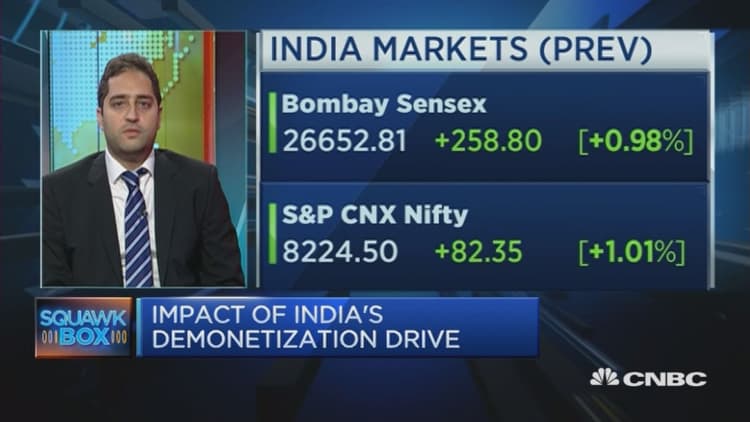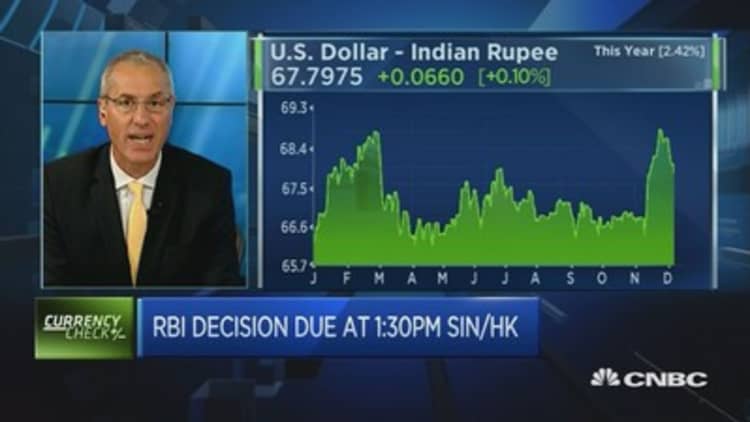Indian companies and banks are expected to face short-term downside risks following the government's surprise demonetization initiative in November that led to a massive cash crunch, according to a report from S&P Global Ratings.
The report suggested that the extent of the impact from demonetization depended on how quickly the government was able to increase its supply of new notes, the duration of the current cash crunch and the pace of the shift in the Indian economy to "less-cash" transactions.
According to the Reserve Bank of India (RBI), about 12.4 trillion rupees ($183 billion) worth of demonetized notes were returned as of Dec. 10, 2016, and 4.61 trillion rupees worth of notes had returned into circulation.
On Nov. 8, Prime Minister Narendra Modi announced all 500 and 1,000 rupee banknotes, about 86 percent of total value of currency in circulation, would be withdrawn and replaced by new 500 and 2,000 rupee notes.
India's massive cash-dependent informal sector will likely bear the brunt of the cash crunch, according to the report, and the pressure could be compounded further by the planned roll-out of the goods and services tax (GST) in 2017.
Broadly, S&P expects the disruption to affect private consumption demand, which accounts for 55 percent of India's gross domestic product (GDP).
The drop in consumption is set to dampen economic growth in the second half of the current fiscal year ending March, 2017; the ratings agency lowered its growth forecast to 6.9 percent for the full fiscal year, from an earlier estimate of 7.9 percent. Prices are expected to fall marginally in the short-term and a delay in private sector investment is also expected.
"We expect lower private consumption in fiscal 2017, but expect demand to revive and growth to rebound in fiscal 2018," said Dharmakirti Joshi, chief economist at S&P's India subsidiary Crisil.
"India should shortly revert back to an 8 percent annual growth trajectory."
The ratings agency does not expect any significant, near-term impact on the credit profiles of India's rated entities, but highlighted the factors to watch:
Sovereign
The sudden demonetization could undermine near-term confidence in the predictability and effectiveness of policymaking in India, S&P said.
Countering that, the GST bill is expect to ease India's byzantine tax system, which has been a longstanding roadblock to growth.
It is also expected to extend the government's revenue source into the unofficial economy and help to bolster weak public finances over time, the rating agency said.
Banks and financial institutions
S&P expects a marginally negative impact for the banking sector in the short run due to soft loan growth, while asset quality and earnings are set to come under pressure at the margin.
Consumers are likely to postpone big ticket purchases for which they would require a loan from the banks, in anticipation of interest rates falling in the future.
Small and medium-sized companies that rely heavily on cash could see revenues decline and face liquidity problems, while a depreciation in the rupee could hurt large borrowers with unhedged foreign currency loans.
The ratings agency said it does not, however, foresee any sharp uptick in non-performing loans (NPL) in the near future as the RBI has given an extension to banks to recognize NPLs for small borrowers with less than 10 million rupees in loans, who are affected by the cash crunch.
Banks are also allowed to accept old 500 and 1,000 currency notes as repayment of loans, S&P said.
Companies
The impact on the credit profile of corporate India is said to be mixed. S&P expects sectors that rely more on cash transactions, such as real estate, gems and jewelry, to require structural adjustments to operate in a "less-cash"-based economy; thus the impact from demonetization is expected to be higher and for a longer duration.
In real estate, those conducting sales in cash or via informal channels would need to consolidate, while the new Real Estate Regulation Act could delay projects, leading to some defaults.
The act, which was passed in parliament earlier this year, makes it mandatory for commercial and residential real estate projects, where the land is over 500 square meters, to register with a regulatory body for greater transparency, the Economic Times reported.




Many jewelry manufacturers would need to move away from the informal economy to join the formal, organized economy which would result in higher costs and increased consolidation, said S&P. The high working capital requirements could make smaller players vulnerable to defaults and closures.
For other sectors such as infrastructure, power and telecommunications, their low sensitivity to near-term economic trends would minimize the impact.
Broadly, the report said Modi's planned structural reforms will need significant changes in the way business is conducted in India and that policymakers need to be flexible to prevent a drop in consumer and business sentiments.
Despite their short-term risks, in the long run, S&P said, "these reforms should significantly improve India's business climate, and the country could regain its status as the world's fastest-growing major economy."


